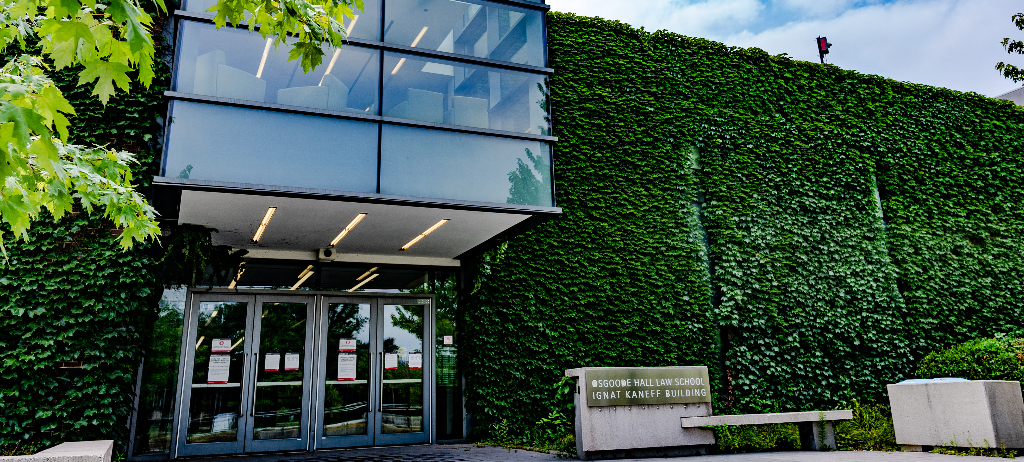
Pictured here: Osgoode Hall Law School on York University’s Keele Campus.
Poverty law front and centre at York’s Osgoode Hall Law School
By Elaine Smith
Osgoode Hall Law School students with an interest in poverty law have opportunities to support community members in lower income Toronto neighbourhoods through two well-regarded legal services clinics – the Parkdale Community Legal Services (PCLS) and Community & Legal Aid Services Program (CLASP Legal Services).
Osgoode students were quite instrumental in establishing Parkdale Community Legal Services in 1971, which was the first community-based legal clinic in Ontario. Funded by Legal Aid Ontario and Osgoode, it is a flagship program that cemented the law school’s social justice tradition.
Each year, 40 upper-year students take an academic seminar on poverty law and for one term serve as caseworkers at the clinic four days per week. Under the guidance of supervising lawyers, Osgoode students deliver front-line legal services to low-income members of the Parkdale-Swansea community.
They are assigned to one of four clinic divisions: Housing Rights; Workers’ Rights; Social Assistance, Violence and Health; or Immigration. Each summer, 20 students are hired as paid employees of the clinic. During their academic term, they serve as peer leaders in their division.
“Parkdale Community Legal Services is unique because its work encompasses both legal representation on client files and community organizing to support systemic change,” said Fay Faraday, PCLS’s Academic Director.
The Community & Legal Aid Services Program is funded by Legal Aid Ontario, the Law Foundation of Ontario, and a York University student levy. Their clients are either students (domestic or international) or individuals from very low-income situations. The program offers assistance with immigration, criminal and administrative law, centring largely on housing-related issues.
“We’re a last resort,” said Scarlet Smith, CLASP’s director. “People come to us when they have no one to speak for them and no representation. Our talented staff lawyers and law students are devoted to providing excellent representation. It is not unusual for our students to attend hearings more prepared than practising lawyers, as our focus is on learning and our hours of preparation can far exceed what a private lawyer can justifiably bill on a file.”
At CLASP, 17 to 20 upper-year students commit a full year to the program. They receive training each May and work as CLASP employees throughout the summer. Come fall, they work for academic credit and, also oversee first-year students who volunteer for a semester, assisting with research and casework. CLASP also has a roster of 50+ volunteer student interpreters to draw on as needed. Students are involved in files right from the initial intake calls through to the completion of the files while receiving valuable mentorship from CLASP’s staff lawyers.
“They manage the cases,” said Smith. “Everything they do goes through our supervising lawyers, but the students themselves meet with clients, conduct research, draft submissions and even examine witnesses at hearings and trials. They are the face of these cases and provide exceptional representation.”
While Osgoode students enter the clinics as novices, they leave with a solid grounding in poverty law.

















